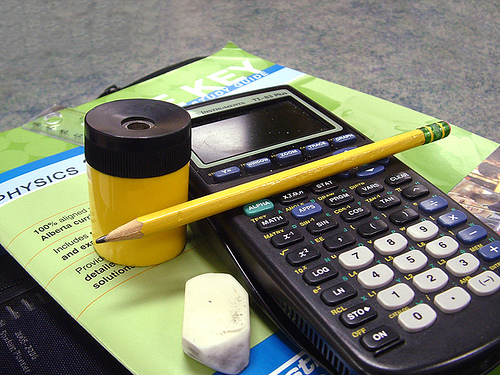Tips - Study Strategies

Tips - Study Strategies:
1. Find out what time of the day is the best to study.
2. Plan a timetable for your study period, for every week.
3. Collect necessary materials like texts, notebooks etc. and keep them beside you, before you sit down to study.
4. Select a place, which is quiet and comfortable. If possible, try to study in the same place every day.
5. Do not wait for an auspicious time to start studying. The most difficult part of studying is to 'get started'. This requires bit of Self-Discipline.
6. Develop a regular study routine. They will save time in the long run.
7. Study rapidly as possible, once you are sure of your work, keep going.
8. Set yourself targets for each study session.
9. Relax now and then. Every hour or so, a five minute break must be taken.
10. Set aside enough time for recreation and sleep; observe good health habits.
11. Alternate your study activities. Do some reading work first, then writing, then work out a couple of problems and so on.
12. List out your work. Work that has been finished, should be ticked off the list. This can be very satisfying.
13. It is important to maintain a good relationship with your family and friends. This will improve your emotional health. A sound emotional health will help your concentration in studies.
14. Be thorough with the subject matter thought everyday.

Merits of Taking Notes:
1. Helps you to concentrate on what you are learning.
2. Helps you to understand better, because you have translated ideas and materials into your own words and diagrams.
3. Notes you have copied are poor aid to understanding because you have mussed the vital stage of interpreting the material before writing it down.
4. Notes are an excellent tool for revision.
5. Note-making is a very good study aid.
Tips - Note Taking in Class:
1. Write down the notes legibly. Remember that you have to read several months before your exams.
2. Try to structure your notes so that they are in logical sentence.
3. Try to get your notes down neatly and make sure they are fairly well spaced.
4. Mention the source of your notes; e.g. from a teacher - teacher's name, from a book - time and author's name.
5. Underline headings, sub-headings, key-words etc. A clear layout will definitely assist your visual memory.
6. Use your own words and phrases if possible. This will help you to understand it at a later date.
7. Quotations should be highlighted.
8. Use abbrevation wherever possible to facilitate speed in note taking.
9. Maintain a separate note book for each subject.








